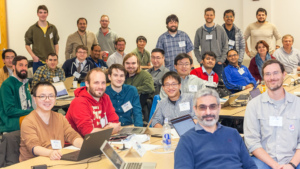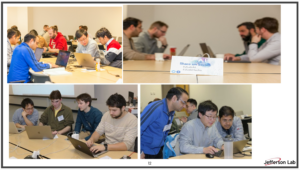
Miu (Andy) Lun Lau, a Boise State Computing Ph.D. student and his team “Palpatine” won the DOE Nuclear Physics A.I. Hackathon at the AI for Nuclear Physics workshop on Mar 5, 2020. The workshop was hosted at the Thomas Jefferson National Accelerator Laboratory on March 4-6, 2020. The Hackathon was sponsored by the Jefferson Lab in conjunction with the University of Virginia’s School of Data Science.
The purpose of the Hack-A-Thon is to address a common but important application of A.I. in experimental nuclear physics: tracking charged particles through magnetic fields, which is often the most time-intensive task in reconstruction algorithms and an excellent example of the power of A.I. in a real-world application. The participants worked in teams with less than or equal to 4 members to solve a set of challenge problems. They started from understanding the infrastructure of large data sets of experimental results, used Neural Network architecture to predict single variable, multi-variable properties of particle events for both single track or multiple tracks, in an environment with or without detector noise.
There were 8 teams of faculty, scientists and students competing this hackathon. The average overall score was around 79. The “Palpatine” team consists of 4 students including Andy, Cade (Michigan State), Jake (University of Virginia) and Jose (Argonne National Laboratory) and ranked 1st place with an overall score of 186.78794411714. (Team “Oxpecker” ranked 2nd place with an overall score of 152.85838412141).
